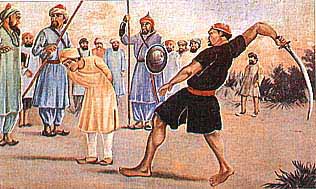
At Sialkot in Panjab lived a Khatri named Bagh Mal. He was a clerk in the
office of Amir Beg, the district officer of Sialkot. There were no Hindu schools
in those days; hence, his son Haqiqat Rae studied in a Muslim school. The
boy was very in-telligent and did better than all other boys in the Persian
language and arithmetic. Many of the Muslim boys were jealous of him.
Haqiqat Rae was married at a young age into a Sikh family of Wadala. His wife's
parents used to narrate the glories and sacrifices of the Gurus and their
Sikhs. He was deeply impressed by their devotion to the Guru and the sacrifices
of Sikhs for their faith.
One day some Muslim boys at his school who were jealous of him used abusive
language against the Hindu gods and the Sikh Gurus. Haqiqat Rae, who was only
fifteen years old, re-torted by disrespectful language for Fatima, the daughter
of Prophet Muhammad. A report against him was lodged with the Qazi, who, af-ter
listening to the school authorities, passed a judgement against Haqiqat Rae,
saying that he should either convert to Islam, or be beheaded.
Haqiqat Rae's father Bagh Mal requested Amir Beg to dissuade the Qazi from
his judge-ment against his son. He pleaded that his son was innocent because
he had only retorted in re-sponse to Muslim boys abusing Hindu gods and Sikh
Gurus. Amir Beg tried his best to save the child, but the Qazi was adamant.
The case was forwarded to the Governor of Lahore.
At that time the Governor of Lahore was Zakariya Khan, who had been persecuting
Sikhs since 1726. He had put a price on Sikhs' heads and issued orders to
hunt them down. Under his orders thousands of Sikhs had been killed and their
heads were brought to Lahore. Thousands more were brought alive to Lahore
and killed at Nakhas, a horse market outside Delhi gate.
Haqiqat Rae was brought before the Governor's court, and Haqiqat Rae's father
Bagh Mal and Amir Beg pleaded the case. Muslim crowds of thousands gathered
before the Governor's court and demanded that the QazI's judgement must be
upheld. Zakariya Khan sought the advice of the provincial Qazi at Lahore,
who confirmed the previous judgement given by the Qazi.
Haqiqat Rae was asked to embrace Islam or face death. As he had heard of brave
Sikh mar-tyrs who never abjured their faith, he too stoutly refused to accept
conversion to Islam. No per-suasion or pressure succeeded in forcing the boy
to embrace Islam. He was beheaded at Nakhas in 1734.
A samadh (memorial) was built to commemo-rate his martyrdom. A fair used to
be held there on Basant Panchmi day in February of every year until the partition
of India in 1947.
Article and painting -courtesy Dr. Santokh Singh (The Guru's Word)